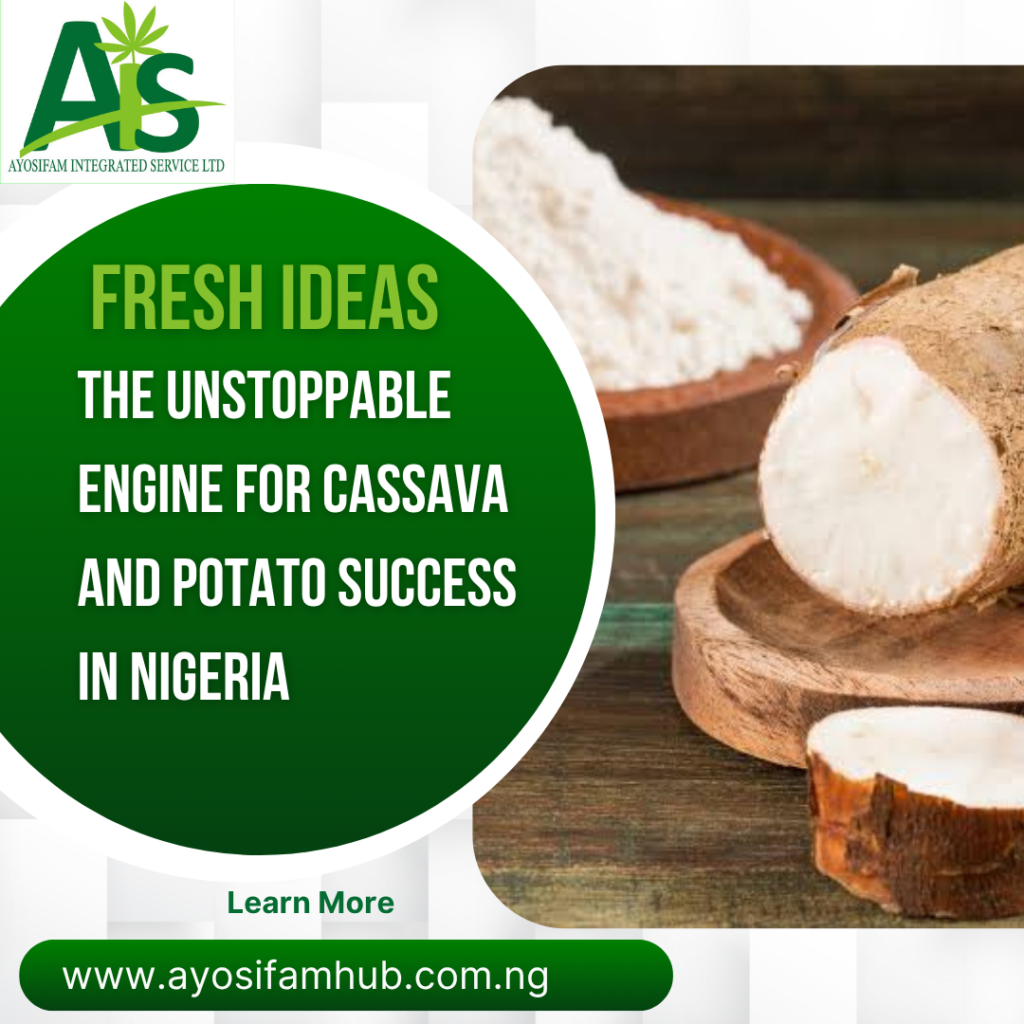
Here at AyosifamHub, our core mission revolves around unlocking the immense, untapped potential of agriculture across Nigeria. Within this vital sector, two crops stand out as true cornerstones of our nation’s food security, economic stability, and rural livelihoods: cassava and potatoes. Nigeria is a leading producer of cassava, and the potential for potato cultivation, particularly in regions like North Central, is rapidly growing. Both are remarkably versatile crops that feed millions, provide income for countless farmers in places like Kwara State, and form the bedrock for various emerging industries. However, to truly solidify their future, amplify the prosperity of our farmers, and ensure sustainable food availability for our rapidly growing population, we must deeply embrace and prioritize something fundamentally crucial: fresh ideas.
Innovation, for the agricultural sector, isn’t an abstract concept or a luxury reserved for niche industries. It is, unequivocally, a necessity. For the millions of cassava and potato farmers across Nigeria, and for the overarching goal of achieving robust food security between now and 2030, simple, practical, and accessible innovations are the key to creating expanded market opportunities within Nigeria and across international borders. These innovations aren’t just about grand technological leaps; they’re about smart, adaptive thinking that can transform every stage of the cassava and potato value chains.
Let’s delve into precisely why embracing fresh ideas is not merely beneficial, but utterly non-negotiable for the continued and enhanced success of both cassava and potatoes.
1. Expanding Market Horizons: Beyond Traditional Staples
For generations, the market for Nigerian cassava has predominantly revolved around beloved traditional food products like gari, fufu, and akpu. Similarly, while potatoes are enjoyed boiled, fried, or as chips, their full industrial potential often remains untapped. Relying solely on these traditional uses inherently limits both crops’ economic potential. Fresh ideas allow us to strategically diversify and tap into new, higher-value markets that can significantly boost farmer income and national revenue.
a. Value Addition is King: Imagine the transformative impact of processing cassava into premium, food-grade flour for the burgeoning baking industry, or industrial starch crucial for textiles, paper, and pharmaceutical manufacturing. Consider its potential as a raw material for producing bio-ethanol, a sustainable fuel source, or glucose syrup, a ubiquitous ingredient in the food and beverage sectors. For potatoes, envision them transformed into high-quality potato flakes for instant mashed potatoes, potato starch for various food and industrial applications, or even specialized dehydrated potato products for long-term storage and export. These aren’t futuristic concepts; they are tangible, immediate opportunities. Realizing them requires investment in improved processing technologies – from advanced drying methods and precision milling for cassava to efficient peeling, slicing, and frying lines for potatoes. Crucially, these involves the continuous development of novel, market-ready products. Let think about locally produced, nutritious cassava-based snacks for school children, gluten-free cassava flour blends, or high-quality, fortified animal feed. For potatoes, consider ready-to-cook packaged potato wedges, innovative snack items, or even specialized potato protein isolates. Each new product line meticulously researched and developed opens up a completely new market segment, creating demand beyond our traditional consumption patterns.
b. Unlocking Export Potential: As global economies increasingly seek sustainable, cost-effective, and versatile raw materials, Nigerian cassava and potatoes are perfectly positioned to become significant export commodities. However, competing on the international stage demands more than just raw quantity. It necessitates consistency in quality, strict adherence to international food safety and processing standards (like ISO certifications), and innovative approaches to packaging, storage, and logistics to ensure products reach their destination in optimal condition. Fresh ideas in supply chain management, quality control, and global market intelligence are vital for capturing this lucrative export market. This applies equally to high-quality cassava starch destined for Asian markets or specialized potato products for European consumers.
2. Boosting Productivity and Efficiency: On-Farm Transformation
The backbone of Nigeria’s agricultural success lies with its dedicated farmers, including those in Kwara. Yet, many still rely on traditional, often labour-intensive methods that can limit yields, increase production costs, and leave them vulnerable to environmental challenges. Fresh ideas offer powerful tools to revolutionize farming practices, making them more productive, efficient, and resilient.
a. Improved Varieties are Game-Changers: Continuous research and development into high-yielding, disease-resistant varieties for both cassava and potatoes are paramount. Picture new cassava strains that mature faster, significantly reduce susceptibility to devastating diseases like Cassava Mosaic Disease (CMD) or Cassava Brown Streak Disease (CBSD), and offer higher dry matter content. For potatoes, this means developing varieties tolerant to late blight, resistant to common pests, and adapted to Nigeria’s specific soil and climate conditions, while also offering desirable culinary or processing characteristics. This directly translates to substantially higher yields from the same land area, boosting farmer profitability.
b. Smart Farming Techniques: Accessible Innovations: Innovation doesn’t always mean expensive machinery. Simple, yet impactful techniques can make a huge difference. Let consider precision planting methods that optimize spacing for both crops, efficient manual or semi-mechanized weeding tools that reduce arduous labour, or optimized fertilizer application strategies based on soil testing. Furthermore, easily accessible mobile applications providing real-time weather forecasts, current market prices, and tailored agronomic advice can empower farmers to make data-driven decisions that enhance productivity and profitability. This is particularly crucial for potato cultivation, which will be more sensitive to specific growing conditions.
c. Appropriate Mechanization: While large-scale machinery might be out of reach for many smallholder farmers, affordable, small-scale processing equipment can be transformative. For cassava, this includes motorized graters, efficient dewatering presses, and improved drying technologies (like solar or flash dryers that reduce fuel usage and spoilage). For potatoes, simple mechanical planters, harvesters designed for small plots, and cost-effective washing and sorting machines can dramatically cut down on labour costs, improve product quality, and accelerate processing, allowing farmers or farmer cooperatives to add value quickly.
3. Tackling Post-Harvest Losses: Preserving Every Harvest
A staggering percentage of harvested cassava and potatoes in Nigeria is lost due to spoilage, inadequate storage facilities, and inefficient transportation. These losses represent not just wasted produce, but also lost income for farmers and reduced food availability for consumers. Innovation offers critical solutions to this systemic problem.
a. Better Storage Solutions: From enhancing traditional storage methods to establishing community-level processing and storage facilities, reducing spoilage after harvest directly translates to more produce reaching the market and higher incomes for farmers. For cassava, this could involve improved traditional barns or simple drying techniques. For potatoes, the development of affordable, ventilated storage sheds or cool chambers is crucial to prevent sprouting and rot, especially in warmer climates.
b. Efficient Logistics and Infrastructure: Investing in better rural road networks and optimizing transportation methods are essential. Ensuring that freshly harvested cassava and potatoes reach processing centres or markets quickly, before deterioration sets in, maximizes their value and minimizes waste. This could involve small-scale collection hubs or better links to existing infrastructure, reducing travel time from farms to major markets.
4. Ensuring Food Security for All: Building Resilience
Cassava’s inherent resilience – thriving even in less fertile soils and under challenging climatic conditions – makes it an invaluable asset for Nigeria’s food security agenda. Potatoes, while requiring more specific conditions, offer high nutritional value and rapid growth cycles, making them excellent for diversification. Continuous innovation is essential to maximize their impact and build robust, future-proof food systems.
a. Nutritional Enhancement (Biofortification): A key area for innovation is the development and widespread adoption of biofortified cassava varieties with naturally higher levels of essential micronutrients, such as Vitamin A. Similarly, research into potato varieties with enhanced nutrient profiles can significantly impact public health, especially in vulnerable populations where nutrient deficiencies are prevalent, directly addressing hidden hunger.
b. Resilience to Climate Change: As global climate patterns become increasingly unpredictable, leading to more frequent droughts, floods, and extreme weather events, research into developing cassava and potato varieties that are more tolerant to these stresses is paramount. Investing in climate-smart agriculture practices will safeguard future harvests and ensure consistent food supply.
c. Stable and Inclusive Supply Chains: Expanding market opportunities, improving on-farm efficiency, and reducing post-harvest losses, we are collectively contribute to creating more stable and reliable supply chains. This ensures consistent availability of affordable, high-quality cassava and potato products for all Nigerian consumers, regardless of their location or economic status.
The AyosifamHub Imperative: Catalyzing Change
At AyosifamHub, our very existence is predicated on bridging the critical gaps between farmers, processors, markets, and the knowledge required for sustainable agricultural growth. Our platform is meticulously built on the premise of fostering connections, facilitating learning, and catalyzing progress. We firmly believe that fresh ideas are the indispensable fuel for this engine of transformation.
We will actively championing and embracing simple, yet profoundly impactful innovations – from refined farm practices and efficient processing techniques to innovative new product development and robust market linkages – we will achieve tangible and lasting results:
a. Substantially Increase Income for Cassava and Potato Farmers: More diversified markets, higher yields, and drastically reduced losses mean more money directly in the pockets of our hardworking farmers in Kwara State, and beyond.
b. Significantly Enhance National Food Security: A robust, diversified, and resilient sector for both cassava and potatoes guarantees a stable and nutritious food supply for all Nigerians, even as the population grows.
c. Create Sustainable Jobs and Economic Opportunities: Value addition, expanded markets, and improved efficiency naturally lead to the creation of numerous new employment opportunities across the entire cassava and potato value chains, from cultivation to processing, distribution, and retail.
The window of opportunity is now. Let us collectively champion these fresh ideas, empower our resilient farmers with knowledge and tools, and together, forge a more prosperous, sustainable, and food-secure Nigeria. This journey, powered by innovation, will uplift communities in Kwara State and beyond, one transformed cassava and potato product at a time.



